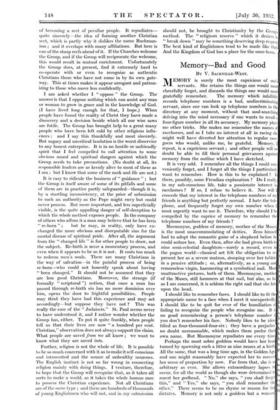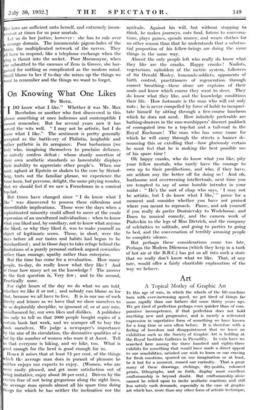Memory—Bad and Good
BY V. SACKVILLE-WEST.
MEMORY is surely the most capricious of one servants. She retains the things one would most cheerfully forget, and discards the things one would most gratefully remember. The memory which infallibly records telephone numbers is a bad, undiscriminating servant, since one can look up telephone numbers in the directory at any moment, without that soul-searching delving into the mind necessary if one wants to recall a four-figure number in all its accuracy. My memory plays me other tricks. She makes me remember the names of racehorses, and as I take no interest at all in racing she might well have diverted her attention to regular race- goers who would, unlike me, be grateful. Memory, I repeat, is a capricious servant ; and other people will no doubt be able to fill their personal grievances against memory from the outline which I have sketched.
It is very odd. I remember all the things I could con- veniently forget, and I forget all the things I particularly want to remember. How is this to be explained ? Is there, possibly, some Freudian explanation ? Do I really, in my sub-conscious life, take a passionate interest in racehorses ? If so, I refuse to believe it. Nor will concede that my interest in the telephone numbers of nn friends is anything but perfectly normal. I hate the tele- phone, and frequently forget my own number when I most urgently want to use it. Therefore, why should I be compelled by the caprice of memory to remember the telephone numbers of my friends ?
Mnemosyne, goddess of memory, mother of the Muses, is the most unaccommodating of deities. Zeus himse had to adopt the romantic guise of a shepherd before he could seduce her. Even then, after she had given birth to nine semi-celestial daughters—surely a record, even in the pagan world—classical art felt the obligation to re- present her as a severe matron, stooping over her tablets in a pensive attitude ; or, alternatively, as a young an' remorseless virgin, hammering at a symbolical nail. Mos unattractive pictures,- both of them. Mnemosyne, mothe of the Muses, still hammers at that nail, but alas, so far as I am concerned, it is seldom the right nail that she hits upon the head.
I should like to remember faces. I should like to fit the appropriate name to a face when I meet it unexpectedly.
I should like to be quit for ever of the humiliation failing to recognize the people who recognize me. It is no good remembering a person's telephone number you don't remember his face. Nobody likes to be iden- tified as four-thousand-four-six ; they have a prejudice, no doubt unreasonable, which makes them prefer the own name. But Mnemosyne repudiates me every time Perhaps the most sober goddess would have her he turned by spawning such a litter as nine muses at a birt All the same, that was a long time ago, in the Golden Age, and one might reasonably have expected her to recove her sense of proportion by now. Far from that, she is arbitrary as ever. She allows extraordinary lapses to occur, for all the world as though she were determined to assert her godhead. " No," she says, " you shall forget this," and " Yes," she says, " you shall remember the other." T re _here seems to be no rhyme or reason for be dictates. Memory is not only a goddess but a woma er laws are sufficient unto herself, and extremely incon- enient at times for us poor mortals.
Let us do her justice, however : she has to rule over strange domain. The innumerable pigeon-holes of the rain, the multiplicated network of the nerves. They 11 have to respond, like a telephone exchange when the lug is thrust into the socket. Poor Mnemosyne, when he submitted to the caresses of Zeus in Greece, she bar- ained for nothing as complicated as the modern mind. mall blame to her if to-day she mixes up the things we ant to remember and the things we -want to forget.































 Previous page
Previous page